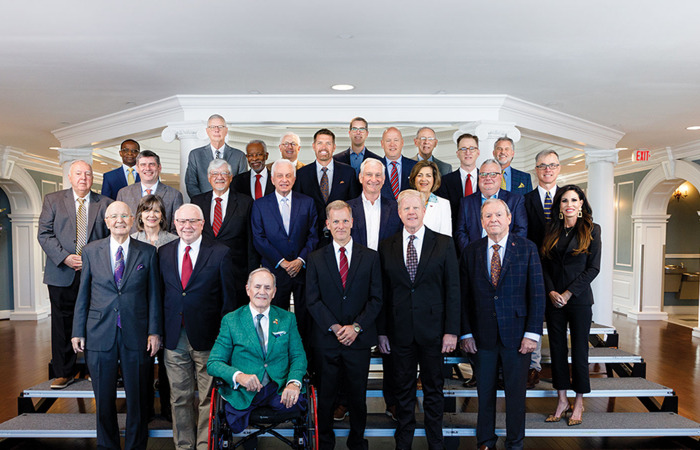
Liberty University President Jerry Falwell
The Constitution’s First Amendment protects all Americans against government efforts to restrict free speech, freedom of the press, freedom of religion, the right to peaceably assemble, and the right to petition the government for the redress of grievances. It’s been part of the Constitution since 1791 and is fundamental to guaranteeing our liberty.
President Trump acted boldly in defense of these rights in March when he announced an executive order requiring colleges and universities to protect free speech on their campuses in order to qualify for federal research dollars. He made his announcement alongside Hayden Williams, who was assaulted in February at the University of California-Berkeley while he was recruiting students to join the conservative group Turning Point USA. Williams was repeatedly punched in the face in the unprovoked attack, leaving him with multiple bruises and a black eye.
“College campuses have become increasingly unsafe for conservatives,” Charlie Kirk, the founder and executive director of Turning Point USA, said. “If the attacker was wearing a MAGA hat, this would be classified as a hate crime and all over every news channel.”
Ironically, some of the most intolerant people in our society are the very ones who preach “tolerance” to advance a radical “social justice” agenda that demands ideological conformity and scorns independent thinking. Liberal tolerance is a one-way street.
Even though Liberty University is a private institution that cherishes its Christian values, we’re not afraid to expose our students to the views of those on the left — even the far left. For example, after getting into a fiery Twitter exchange with “AOC” (Rep. Alexandria Ocasio-Cortez, D-N.Y.), I tweeted a sincere invitation for her to come and explain her socialist positions to our student body. As of yet, she hasn’t accepted the invitation. But I can guarantee you that if she comes, she will find Liberty to be one of the most hospitable campuses in our nation.
Liberty University invites a wide variety of nationally known leaders to our thrice-weekly Convocation. We offer them a public forum in front of our student body where they are free to express their views on faith, justice, ethics, and politics. Some on the political left accept our invitation. Most do not, but we continue to make the offer.
In March, we hosted Alan Dershowitz, Harvard law professor emeritus and a veteran public intellectual on the left. When he arrived on campus, there were no protests, no public demonstrations, no obscene signs, etc. Our students welcomed him with the charity, common decency, and dignity that he deserved, recognizing the importance of civil discourse that is indispensable to the mission of education. By contrast, this was not the same treatment he received at Colgate University just a few months prior in November 2018. Dershowitz told our students gathered for Convocation:
“I think many people would be shocked to know that Liberty University is more diverse in its opinions than Harvard University. … Today, unless you speak on behalf of identity politics, on groupthink, radical left views, you’re not really encouraged to come on campus. I’m a liberal, and I have been banned and shut down on university campuses because I support Israel. … I think every American should know this, that you have invited me to speak here today even though we have some fundamental disagreements about some social issues, about some political issues, about some religious issues — but you welcome me with open arms. The obverse is not true. Somebody with your views would not be welcome to speak today at major Ivy League universities. I’d be there defending you. I’d be there introducing you. I’d be proud to have you as a speaker on my campus. But you would be shut down. There would be efforts to what’s called ‘de-platform’ you, which is a fancy word of saying, censoring you, not letting you speak.”
Likewise, when Jordan Peterson, University of Toronto professor of clinical psychology and a world-renowned author, came this spring, our student body again behaved admirably. Contrast that with Harvard University students who jeered and protested Peterson during their “Open Campus Initiative” in 2017, stating opposition to his views on gender diversity and transgenderism. Keep in mind that Peterson is a secularist — not a professing Christian or a conservative, right-wing politician. Harvard preaches but doesn’t practice tolerance.
In 2015, we hosted democratic socialist Sen. Bernie Sanders, I-Vt., who spoke about a vast array of political and economic topics. And in 2018, former President Jimmy Carter delivered the keynote speech for our 45th Commencement. Some alumni wrote to me to protest those invites. But we don’t think our students are delicate snowflakes who must be sheltered from free speech and the open exchange of competing ideas.
There have been sensational stories written about Liberty and censorship, rumors that we do not allow opposing views or First Amendment rights. But that is far from true. We uphold freedom and put its ideals into practice.
Earlier this year, a small group of Liberty students gathered to hold a demonstration in support of the #MeToo movement and against comments made at CPAC that they deemed were “transphobic.” The comments in question were made by my wife, Becki Falwell. I support entirely what she said and her right to say it. And I also supported Liberty students’ right to protest on campus grounds.
Note that I said “Liberty students” — not activists-for-hire who go on social media and announce that they’re driving across the country to organize a protest on our campus. (Some out-of-town protestors even pretend to be students.) We’re a private university and have the right to control who shows up on our property. Annually, we are ranked as one of the safest campuses in the nation, and we don’t achieve that status by turning over control of our grounds to outside groups who know the easy publicity they’ll get from media if they come here.
While some of our friends were angry that Liberty “allowed” the #MeToo student demonstration to take place, I believe their arguments for stricter speech regulation on campus are misguided. Beliefs cannot be reinforced unless they are challenged, and that happens when one engages with those who hold dissenting views.
That’s what college is supposed to be about. Free speech and intellectual diversity are two of the most important pillars of a college education. That’s why I urge every college and university in the country to encourage open political discourse on their own campuses — just as we do at Liberty University.
If there’s one thing I’m certain of, it’s that there will be a strong and critical response to this article by a few former students and a handful of national media determined to paint Liberty in a completely different light on these issues.
In the past few years, some students screamed “censorship” when they didn’t get their every word published in our campus newspaper, the Liberty Champion. Insisting on their inviolable right to publish, the students took to social media or alerted national journalists of the alleged suppression of the First Amendment taking place. And there’s no story that journalists love to pursue more than the tired trope: “I’m a Liberty student who doesn’t like everything here.”
Of course, if we gave our side of the story — a detailed, public, refutation to specific facts of these complaints — we would border on violating the Family Educational Rights and Privacy Act (FERPA).
Instead, we choose to let our actions speak for themselves — especially when it comes to freedom of the press. Among evangelical colleges and universities, I challenge you to find a campus newspaper better funded or institutionally supported than ours. In a day where universities need to pinch every penny they can, student journalism is often an easy place for budget cuts. But we fund the production and publishing of over 15,000 copies of the Champion with each issue — over 20 issues per year. Distributed throughout the community, the paper has one of the largest circulations for newspapers in Central Virginia.
When you factor in the annual costs for salaries and scholarships for Champion faculty and student staff, printing and distribution, facilities, and equipment, each year Liberty spends about $450,000. This newspaper represents a significant investment in our students, an opportunity (as advertised to prospective staff) to:
“Build your portfolio with hands-on newspaper experience. Enjoy interview opportunities with high-profile leaders. Learn how to meet real-story deadlines in news, sports, feature, and editorial writing. And gain the print and web writing skills you’ll need as a professional journalist.”
This year’s Champion students published over 650 stories and nearly 500,000 words. How many did I see before they went to print? I can count them on the fingers on one of my hands. Of course, I didn’t relinquish my right to read an advance copy, but I’ve got enough work to keep me busy and nobody brought anything of concern for me to see. If they had, I would have weighed in on the matter. I have a fiduciary responsibility to the Board of Trustees to provide leadership to this university, and I make no apology for taking my duties seriously. I’m incredibly proud of the job our students are doing. They are gaining real-world experience and learning to engage politically.
The question people ask about newspapers funded by private colleges is this: Do the students have complete autonomy to print anything they want? Of course not. Let’s give you a little insider baseball. There’s not a single university-funded campus newspaper published by a Christian institution of higher education in North America that publishes every word of news and opinion that the students draft.
But that standard isn’t even attained within the newsroom of commercial newspapers and magazines. Do you recall reading pieces in The New York Times or Sojourners that gave a positive portrayal of the current White House Administration? Does The Chronicle of Higher Education print articles proving the prudence of not offering tenure to faculty? Does World, an evangelical magazine, publish pro-Planned Parenthood opinion pieces? Have you ever read a Cosmopolitan story urging chastity before marriage? In every case, the answer is no. Somebody named “editor” or “publisher” makes decisions every day in newsrooms — and those decisions shape the reputation of the paper and determine who spends money to read it.
Not all news is #FakeNews. But the idea of complete journalistic objectivity is utter nonsense. And so is the idea that a university is guilty of censorship simply because every single story or opinion piece that a student types on their keyboards doesn’t get sent to the printers.




